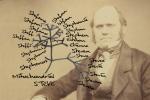
With the addition of Stephen D. Kinrade on August 25, 2009, NCSE's Project Steve attained its 1100th signatory. A tongue-in-cheek parody of the long-standing creationist tradition of amassing lists of "scientists who doubt evolution" or "scientists who dissent from Darwinism," Project Steve mocks such lists by restricting its signatories to scientists whose first name is Steve. (Cognates are also accepted, such as Stephanie, Esteban, Istvan, Stefano, or even Tapani — the Finnish equivalent.) About 1% of the United States population possesses such a first name, so each signatory represents about 100 potential signatories. ("Steve" was selected in honor of the late Stephen Jay Gould, a Supporter of NCSE and a dauntless defender of evolution education.)
Although the idea of Project Steve is frivolous, the statement is serious. It reads, "Evolution is a vital, well-supported, unifying principle of the biological sciences, and the scientific evidence is overwhelmingly in favor of the idea that all living things share a common ancestry. Although there are legitimate debates about the patterns and processes of evolution, there is no serious scientific doubt that evolution occurred or that natural selection is a major mechanism in its occurrence. It is scientifically inappropriate and pedagogically irresponsible for creationist pseudoscience, including but not limited to 'intelligent design,' to be introduced into the science curricula of our nation's public schools."
Among the 1101 current signatories to Project Steve are 100% of eligible Nobel laureates (Steven Weinberg and Steven Chu), 100% of eligible members of President Obama's Cabinet (Steven Chu, the Secretary of Energy), at least ten members of the National Academy of Sciences, the authors of widely used textbooks such as Molecular Biology of the Gene, Psychology: An Evolutionary Approach, and Introduction to Organic Geochemistry, and the authors of popular science books such as A Brief History of Time, Why We Age, and Darwin's Ghost. When last surveyed in February 2006, 54% of the signatories work in the biological sciences proper; 61% work in related fields in the life sciences.
